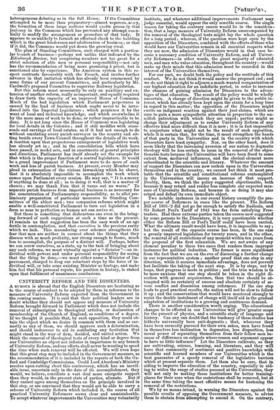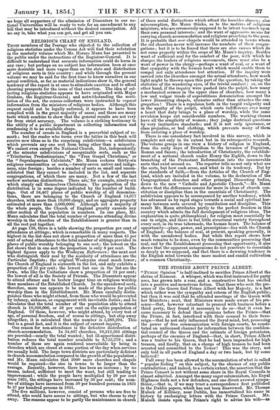UNIVERSITY REFORM AND THE DISSENTERS.
A RUMOUR is abroad that the English Dissenters are hesitating as to the course of conduct to be adopted by them in reference to the measure of University Reform expected from the Government in the coming session. It is said that their political leaders are in doubt whether they should not oppose any measure of University Reform brought forward in Parliament which does not include the removal of subscription to theological articles, or declaration of membership of the Church of England, as conditions of a degree. If we thought it possible that, by such opposition, they could ob- tain the object which we desire in common with them and as ear- nestly as any of them, we should approve such a determination, and should endeavour to aid in combating any hesitation that might stand in the way of firm, decided, and united action. We think the removal of theological tests of every kind or degree from our Universities an object not inferior in importance to any branch of University Reform, andour efforts shall never bewanting to speed the time when such removal will be effected. We will even hope that this great step may be included in the Government measure, as the recommendation of it is included in the reports of both the Ox- ford and Cambridge Commissions. Could Lord Aberdeen's Ministry resolve upon cutting short this controversy, which has an inevit- able issue, uncertain only in the date of its accomplishment, they would, we believe, conciliate a vast deal more energetic support than they would, in the present state of parties, alienate. But if they cannot agree among themselves on the principle involved in this step, or are convinced that they would not be able to carry a scheme of University Reform which included it, the course of all practical University Reformers seems clear and unmistakeable. To accept whatever improvements the Universities may voluntarily
institute, and whatever additional improvements Parliament may judge essential, would appear the only sensible course. The single reason for taking the contrary course would lie in the considera- tion, that a large measure of University Reform unaccompanied by the removal of the theological tests might lay the whole question for a long period ; whereas, if the question were kept open by the opposition of the Dissenters, combined with the efforts of those who would have our Universities remain in all essential respects what they are now, the admission of Dissenters would in that case be- come a necessary condition of University Reform, and all Univer- sity Reformers—in other words, the great majority of educated men, and men who value education, throughout the country—would make up their minds that this admission must be conceded in the interest of the Universities themselves.
For our part, we doubt both the policy and the rectitude of this conduct. We do not think it would answer the proposed end ; and we do not think it right to adjourn a much-wanted reorganization of our highest education for an indefinite period, in order to increase the chances of gaining admission for Dissenters to the advan- tages of that education. The result of the policy would be wholly uncertain. A change of direction might be given to the public in- terest, which has already been kept upon the strain for a long time in regard to this matter ; the opposition of the Dissenters might excite an indignant reaction against their just claims, which are sure to gain a more sympathetic attention in proportion to the un- selfish patriotism with which they are urged; parties might so change their adjustment as to render University Reform of any effective kind more difficult than it is now ; it is in fact impossible to conjecture what might not be the result of such opposition, while it is certain that, for the time, it must strengthen the hands of that party in the Universities and in the country with which Dissenters have least sympathy. Nor, on the other hand, does it seem likely that the increasing aversion of our nation to dogmatic theology will be less certain to issue in the removal of the objec- tionable tests because the Universities will have been freed to some extent from mediaeval influences, and the clerical element more subordinated to the scientific and literary. Whatever the amount of support the Dissenters can now reckon upon in the Universities themselves and in the country, we cannot but think it most pro- bable that the scientific and constitutional reforms contemplated in the Universities will insure an increase of that support. Doubly, then, we think the policy suggested objectionable, both because it may retard and render less complete our expected mea- sure of University Reform, and because in so doing it may also retard and defeat its own immediate object.
Two notable instances in our recent history exemplify the pro- per course of Reformers in cases like the present. The Reform Bill of 1831-'2 did not go far enough to satisfy the Radicals, and Sir Robert Peel's Tariff of 1842 was far from satisfying Free- traders. Had these extreme parties taken the course now suggested by some persons to the Dissenters, it is very questionable whether either the Reform Bill or Peel's Tariff could have been carried. What the ultimate result would have been, it is impossible to say; but the result of the opposite course has been, in the one case a greatly improved legislation for twenty years, and in the other, the removal of all restrictions of any moment within ten years from the proposal of the first relaxation. We are not aware of any element peculiar to these two cases that renders them improper instances for political induction. The former is more significant from the fact that we are on the eve of discussing a further change in our representative system ; another proof that one step in any direction, while it secures immediate advantage, does not prevent but facilitate the taking of the next step. It is by steps, not by leaps, that progress is made in politics ; and the true wisdom is to be more anxious that one step should be taken in the right di- rection with general acquiescence, than that two should be at- tempted with no certainty of success and absolute certainty of se- vere conflict and dissension among reformers. If the one step leads to good practical results, the nation will not be slow to follow it up ; and the conservatism that would have mustered strongly to resist the double instalment of change will itself aid in the gradual adaptation of institutions to a growing and continuous demand.
There is another consideration worth urging. The educational changes to be effected in our Universities will give greater scope for the pursuit of physics, and a scientific study of language and history. Can any one doubt that the tendency of these studies has hitherto universally been anti-dogmatic ; that, wherever they have been earnestly pursued for their own sakes, men have found in themselves less inclination to dogmatize, less disposition, less moral power of separating themselves from their fellow men be- cause of differences on subjects where reason and argument appear to have so little influence ? Let the Dissenters cultivate, as they are cultivating, science, learning, and literature, and they wiR have that community of sentiment and positive knowledge with scientific and learned members of our Universities which is the best guarantee of a speedy removal of the legislative barriers which at present separate them. Let them also be sure, that in aiding to improve the education of the country, especially in aid- ing to widen the range of studies pursued at the Universities, they will not only be making those institutions far better training- places for their sons when the restrictions shall be removed, but at the same time taking the most effective means for hastening the removal of the restrictions.
We by no means intend, in warning the Dissenters against the possible results of opposing the Government measure, to advise them to abstain from attempting to amend it. On the contrary, we hope all supporters of the admission of Dissenters to our na- tional Universities will be ready to -vote for an amendment to an bill that may be introduced without the desired emancipation. All we say is, take what you can get, and get all you can.



























 Previous page
Previous page